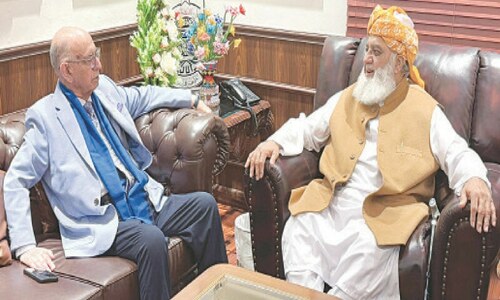ISLAMABAD, Aug 6: Law experts and representatives of civil society here on Wednesday reviewed the Muslim family laws and suggested comprehensive amendments to them in order to facilitate women seeking justice in matters relating to marriage, divorce, Khula and maintenance.
The consultative meeting organised by Aurat Foundation under its Legislative Watch Programme made a clause-wise scrutiny of the Muslim Family Laws Ordinance 1961, the West Pakistan Rules Under the MFLO, the form of Nikahnama, the West Pakistan Family Courts Act 1964, the West Pakistan Family Courts Rules 1965, the Child Marriage Restraint Act 1929 and the Dissolution of Muslim Marriage Act. It also prepared recommendations which would be presented to the government after their final drafting by experts.
The participants also condemned the practice of child marriage in the country and deliberated on the need for concrete measures against the practice.
The meeting came up with a major recommendation for changes to the Child Marriage Restraint Act: that “child means a person of either sex who is under eighteen years of age”. It recommended imprisonment of a minimum of one year, which may be extended to five years, with a fine extending to Rs25,000 for a male adult above eighteen years marrying a girl less than sixteen years of age.
They also agreed on several amendments to laws relating to the dissolution of Muslim marriage including a provision under which a woman could seek dissolution if the whereabouts of her husband have not been known for a period of two years; that the husband has neglected her or has failed to provide her maintenance for one year; that the husband has been sentenced to imprisonment for a period of three years or more; the husband has failed to perform, without reasonable cause, his marital obligations for a period of one year; and if he frequently assaults her or makes her life miserable by cruelty of conduct even if such a conduct does not amount to physical ill-treatment, or associates with persons of evil repute or leads an infamous life.
The meeting also suggested that at least one family court should be set up in each district presided over by a woman judge.
The speakers stressed that amendments to the Muslim family laws were essential as these laws had been neglected for years and only small procedural amendments had been made to them so far. They said it was due to the efforts of civil society orgainsations that changes to the Hudood laws and law on ‘honour’ crimes had been enacted, though with a lot of lacunas.
Those who attended the meeting included Justice (retired) Majida Rizvi, Justice (retired) Nasira Javed, Dr Faqir Hussain, Secretary Law and Justice Commission; Syed Iqbal Haider, former federal law minister; Justice (retired) Shaiq Usmani, Shamsa Ali, Prof Akmal Waseem, Anis Haroon, Imran Qureshi Advocate, Noor Naz Agha Advocate, Shamim Malik Advocate, Shahnaz Hameed Khattak Advocate, Shakeel Azam Awan Advocate and Habib Tahir Advocate.











































Dear visitor, the comments section is undergoing an overhaul and will return soon.